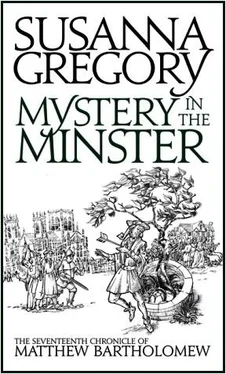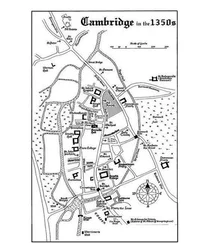‘ The Conversion of the Harlot ,’ said Isabella, while Langelee sniggered like a schoolboy and Radeford’s jaw dropped. ‘I do not see the problem, Father Abbot. Many people have told me that they are looking forward to it.’
‘I am sure they are,’ said Multone, his expression pained. ‘But we Benedictines cannot be seen staging ribald plays! We shall be a laughing stock!’
‘It is not ribald!’ objected Isabella, shocked. ‘It is by Hrotsvit of Ganderheim, a saintly nun.’
‘She is right,’ said Bartholomew, recalling a performance he had once seen in Paris. ‘It begins with a long and rather tedious discussion between clerics about harmony in the created world, and the rest is a debate between the harlot – who has since converted to Christianity – and her confessor. There is nothing remotely bawdy about it.’
‘That is even worse!’ groaned Multone. ‘There will be a riot, because the title suggests something rather more … entertaining. You must abandon it, and find another.’
‘But we cannot!’ cried Isabella, dismayed. It was unusual for a novice to defy an abbot, but she was the niece of an archbishop, which granted her a certain licence unavailable to others. ‘We have already hired players and started rehearsals. Or are you suggesting we cancel it altogether?’
‘No!’ gulped Multone. ‘The people of York are fond of their dramas, and depriving them of one is more than my life is worth. I suppose it will have to go ahead, although I think I shall change its title. How about The Confessions of an ex-Whore ?’
‘I think you might find that has similar problems, Father,’ said Michael, maintaining a perfectly straight face, although Bartholomew, Radeford and Langelee were hard pressed not to laugh.
‘It is a fine play,’ said Isabella earnestly. ‘It is all about a greedy, debauched, sinful person, who repents her sins and is saved. And as so many people in York are greedy, debauched and sinful, it will touch their hearts and make them eager to atone for their vices.’
‘Do not hold your breath,’ muttered Multone. He turned to the scholars. ‘Forgive me. I did not intend our first conversation to comprise a discussion about lewd dramas. May I assume that you are here about Huntington? Sir William told me he had written to tell you what has happened.’
Langelee nodded. ‘It was kind of him to warn us, because otherwise we might have been too late. The vicars-choral have no right to claim what Zouche intended for Michaelhouse.’
Multone inclined his head, but was too politic to take sides, so confined himself to saying, ‘They are tenacious and determined, so you will have to produce plenty of documentation to defeat them.’
‘I can provide some,’ whispered Oustwyk in Bartholomew’s ear, tugging his sleeve to gain his attention. ‘I know some excellent forgers, who will do it cheap. Just let me know.’
‘I hope you win,’ said Isabella. ‘My uncle did intend Michaelhouse to have that church, because I heard him say so myself. And so did Cousin Helen. Besides, the vicars only want it so they can buy themselves more new shoes. Please tell me if I can do anything to help. I read well, and will help you trawl through as many muniments as you like.’
‘Yes, please,’ said Radeford eagerly, before anyone could refuse. ‘Thank you.’
‘And when you have finished pawing through dusty old deeds, you must come to my convent for a lute lesson,’ said Alice to Langelee. ‘It has been far too long since we made music together.’
Not long after, there was another knock on the door. Oustwyk went to answer it, while Multone began to hold forth about a letter he had just received from the Archbishop of Canterbury, in which the sin of pride was blamed for the plague that had swept across the country some ten years earlier. Isabella listened attentively to the pious reflections, but the others were bored, and Bartholomew hated being dragged back to the hellish time when his medicines had been useless and much-loved patients had died in his arms. He was startled from his gloomy reverie when two more Benedictines were shown in. Multone grimaced his annoyance.
‘How many more times must I tell you that visitors are to be kept downstairs until I send for them?’ he hissed in his steward’s ear. ‘It is getting ridiculously crowded in here!’
‘Langelee!’ exclaimed one of the newcomers. He was a pleasant-faced man with short brown hair, who carried himself with the careless grace of the aristocrat. He spoke French so flawlessly that it could only be his mother tongue. ‘I heard you might come to challenge the vicars, and I wanted to invite you to stay in Holy Trinity, but…’
‘But I thought it inadvisable,’ finished Multone. He introduced the Frenchman as Prior Jean de Chozaico, and the other monk as Anketil Malore. Then he returned to the subject of Holy Trinity. ‘It was attacked only last week, and guests should not be subjected to that sort of thing. Besides, we have a nice hospitium here.’
‘Spies?’ asked Langelee of Chozaico sympathetically, speaking the vernacular, because his French was almost as poor as his Latin. ‘People still think you harbour them?’
Chozaico winced. ‘Yes, because of our status as an alien house. It is galling, because we have tried our best to win the city’s affection – giving alms, making donations to worthy causes…’
‘The Carmelites are far more likely suspects than us,’ added Anketil, who was taller than his Prior, and slimmer, with hair so fair as to make him appear bald. ‘They sue anyone who owes them money, presumably so they can send it to their foreign masters.’
‘No,’ said Chozaico, regarding his companion sharply. ‘They are not guilty either, and–’
‘You were one of Zouche’s executors, Anketil,’ interrupted Langelee rudely, turning the subject to one that interested him more. ‘Surely his last testament contained a sentence about Huntington? The codicil has been misplaced, but what about the will itself?’
‘It confined itself solely to his chantry chapel,’ replied Anketil. He looked pleased to have been spared a rebuke from his Prior. ‘And although I heard him say he wanted Michaelhouse to have Huntington, I am not aware that he wrote anything down. However, the man to ask is John Dalfeld.’
Langelee groaned. ‘I was hoping to avoid that. I cannot abide lawyers, and Dalfeld is worse than most.’ He either did not notice or did not care about Radeford’s hurt expression. ‘I do not suppose there has been any improvement in him since I left?’
‘He has grown in importance,’ replied Chozaico carefully. ‘Thoresby uses him a great deal.’
‘He does not even live in the Franciscan Priory now,’ added Anketil. ‘He has his own house.’
‘On the Ouse Bridge,’ elaborated Multone. ‘I asked Warden Stayndrop why he allowed one of his friars such liberty, and he said it was expedient.’
‘In other words,’ translated Alice, ‘Stayndrop was glad to be rid of him. Dalfeld was arrogant, nosy and sly when you knew him, Ralph, but now he is worse than ever. In fact, he is a beast.’
‘He is not very religious, either,’ added Isabella, in a way that suggested that she considered this the ultimate damnation. ‘He does not even bother wearing his habit these days.’
Chozaico cleared his throat, clearly uncomfortable with such blunt talking. ‘If Dalfeld cannot help you, try looking in the minster library. When Thoresby became Archbishop, he sent all Zouche’s correspondence there, so if a codicil does exist, that is where it will be.’
‘Thank you,’ said Langelee glumly. ‘But I suppose we had better start with Dalfeld. We shall visit him today.’
‘That will not be necessary,’ said Multone. ‘Because I asked him to come here this morning for that express purpose. I thought you might prefer to deal with him in my presence, because he is…’
Читать дальше












